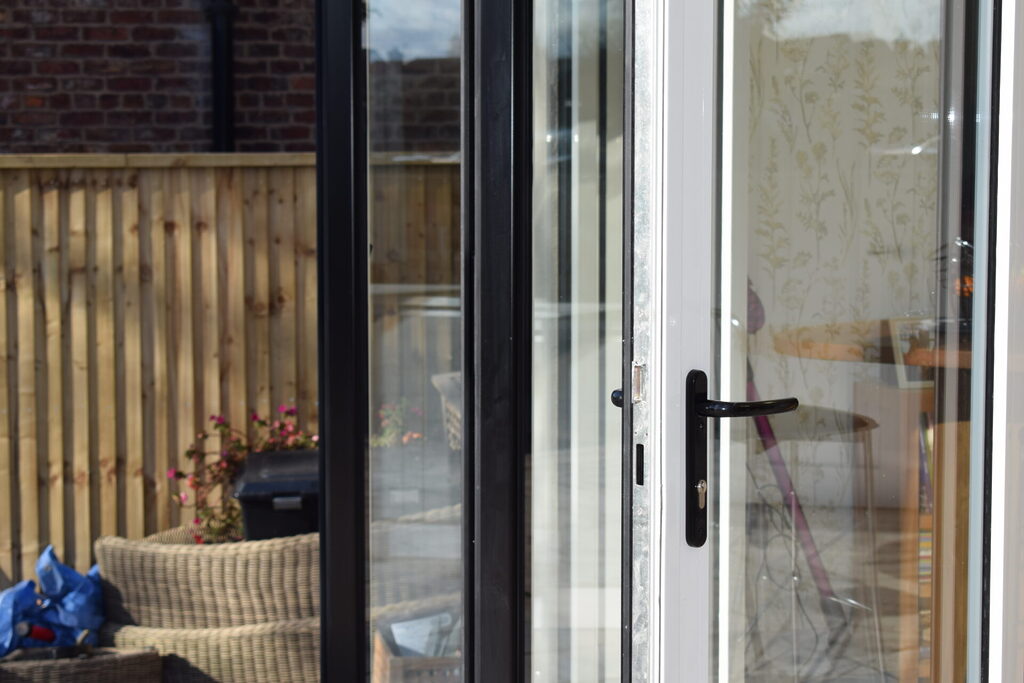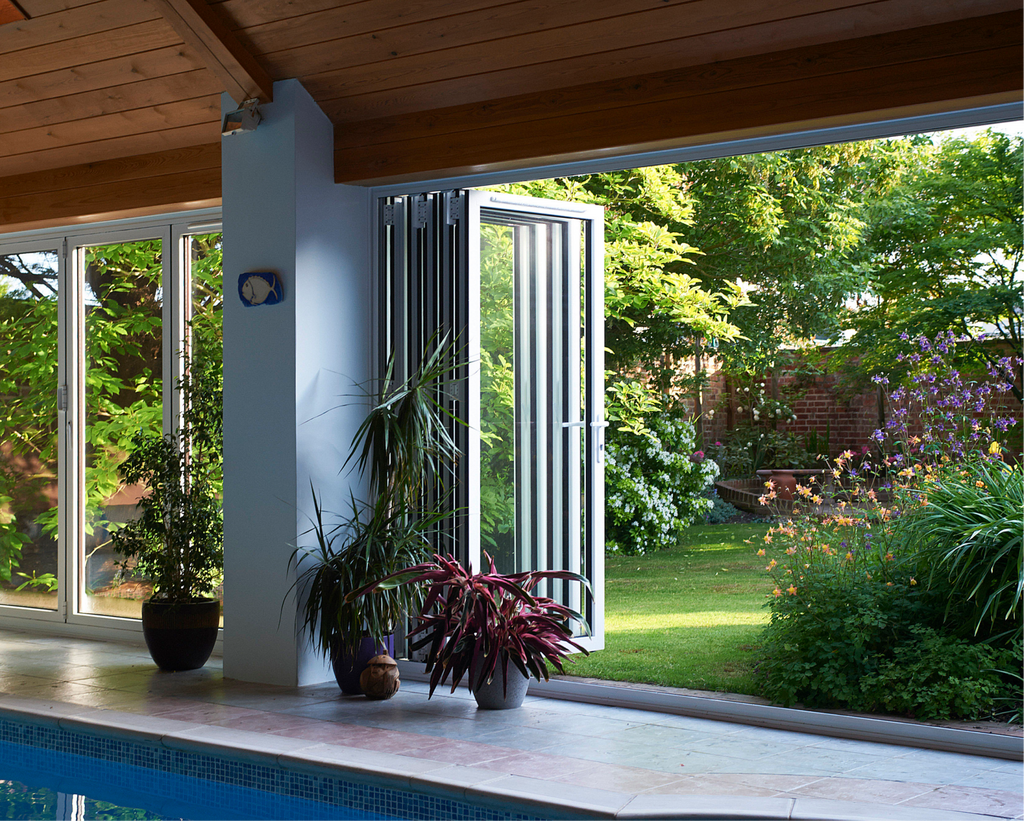Last Updated on 4 December 2024 by Tia Ellahi
Do You Need a FENSA Certificate for Bifold Doors?
Yes, if you’re replacing bifold doors in England or Wales, a FENSA certificate is required to confirm that the installation meets building regulations for safety, energy efficiency, and compliance.
Thinking of upgrading your home with bifold doors? At GFD Homes, we know there’s a lot to consider, and FENSA certification can sometimes feel like one of those technical details.
Let’s break it down together to make this part of your home improvement journey simple.
In this guide, we’ll explain what a FENSA certificate is, when it’s required, and how it impacts your bifold door project.
Looking for something specific? Jump right to it:
- What is a FENSA Certificate?
- Benefits of FENSA-Certified Bifold Doors
- How to a Get FENSA Certificate for Bifold Doors
- Is a FENSA Certificate the Only Option for Compliance
- FAQs
What is a FENSA Certificate?
A FENSA (Fenestration Self-Assessment Scheme) certificate might sound fancy, however, it’s simply an official way to confirm that your new bifold doors meet the necessary building regulations.
FENSA certification is essential for replacement doors and windows in England and Wales, ensuring installations are energy-efficient, safe, and up to legal standards.
Here’s why this certification matters:
Legal Compliance:
It confirms that your new doors and windows meet necessary building regulation standards, so you can feel confident in your home’s compliance.
Resale Value:
A FENSA certificate reassures future buyers that your home improvement choices meet compliance standards and are professionally installed.
Peace of Mind:
When you choose a FENSA-certified installer, you’re guaranteed a high-quality job and won’t need separate building control inspections.

For more insight into how bifold doors work, read our article on what is a bifold door.
What Does FENSA Not Cover?
While FENSA certification is vital for most replacement windows and doors, it has limitations. Here’s what FENSA does not apply to:
New Builds: FENSA certificates are only for replacement work and aren’t issued for new properties.
Extensions: If your bifold doors are part of a new extension, you’ll likely need building regulations compliance from your local authority.
DIY Installations: FENSA certification applies to professional installations. If you’re installing the doors yourself, building regulations approval through your local authority will be necessary.
Height Restrictions: FENSA applies to installations on buildings up to 18 metres in height. For taller buildings, additional compliance measures may be required.
Other Exclusions: FENSA certification also excludes:
- New conservatories
- New or unheated porches
- Loft conversions
- Property conversions (such as dividing a house into flats)
- Repairs that don’t involve the frame
- Commercial properties, listed properties, and some properties in conservation areas.
Benefits of FENSA-Certified Bifold Doors
When you choose FENSA-certified bifold doors, you’re getting more than just legal compliance—you’re gaining peace of mind knowing that they will ensure energy efficiency, safety, and quality for your home. Here’s what else you’ll enjoy:
Energy Efficiency:
Certified installations meet today’s energy standards, keeping your home cosy and helping you save on heating bills.
Safety Standards:
Our team ensures your doors are installed securely and safely.
Hassle-Free Compliance:
With a FENSA-certified installer, there’s no need to arrange separate inspections through your local council, saving you both time and extra fees.
Insurance-Backed Guarantee (IBG):
Many FENSA certificates include an IBG, which covers the installation’s workmanship. This means if your installer were to go out of business, you’re still covered for any remedial work that might be necessary.
Ready to upgrade? Take a look at our smart aluminium bi-folding doors for a stylish, certified option that meets high standards.
How to Get a FENSA Certificate for Bifold Doors
We’re here to make things easy for you! Here’s a step-by-step guide on how best you can get your FENSA certificate sorted for your bifold doors, hassle-free:
Choose a FENSA-Certified Installer:
Only companies registered with FENSA can issue these certificates, so confirm your installer is certified.
Working with a FENSA-registered installer ensures your installation meets required standards, and that you’ll receive a FENSA certificate upon completion.
Complete the Installation:
Once your bifold doors are installed, the FENSA-registered installer will submit the details to FENSA on your behalf.
Receive Your Certificate:
FENSA will process your details and send your certificate, typically within a few weeks.

Thinking about budgeting for your new doors? Check out our guide on bifold doors cost to help you plan.
Can You Get a FENSA Certificate Retrospectively?
Sometimes, homeowners overlook FENSA certification during installation. If this sounds like your situation, there are a couple of options:
- Replacement Certificate: If a FENSA certificate was issued but misplaced, you can request a replacement directly through FENSA.
- Building Regulation Certificate: If no FENSA certificate was ever issued, you may need to apply for a building regulations compliance certificate through your local authority.
For more guidance on requirements, our planning permission for bifold doors article may be helpful!
How Long Does It Take to Get a FENSA Certificate for Bifold Doors?
Typically, you can expect to receive a FENSA certificate about two to three weeks after your installer submits the details to FENSA.
This streamlined process removes the need for separate building control inspections, helping you save time and reduce hassle.
Occasionally, factors like high demand or processing delays can slow things down, so it’s a good idea to double-check with your installer to confirm they’ve submitted everything on time.
Is a FENSA Certificate the Only Option for Compliance?
While a FENSA certificate is one of the recognised documents for proving compliance with building regulations for replacement doors and windows, it’s not the only option!
Other certification bodies also provide similar guarantees, ensuring your installation meets required safety and energy efficiency standards.
One such alternative is Assure Certification, which works in a similar way to FENSA. Here’s how Assure Certification compares:
- Compliance with Building Regulations: Like FENSA, Assure Certification ensures that your bifold doors or windows comply with current building regulations, covering areas such as thermal performance, ventilation, and safety.
- Certificate Issuance: After a certified installer completes the installation, Assure issues a certificate of compliance, which serves as proof that the work meets the required standards.
- Insurance-Backed Guarantees (IBGs): Similar to FENSA, Assure Certification also offers IBGs, providing additional peace of mind in case the installer ceases trading.
Although FENSA is the more commonly recognised scheme, Assure Certification is an equally valid and great alternative for demonstrating compliance,
Whether you choose FENSA or another body like Assure, what matters most is that the installation is carried out by a certified professional, ensuring your project meets all necessary regulations.
Get Quality Bifold Doors With GFD Homes, Today!
Let’s make your home improvement vision a reality together! For high-quality, bifold doors, check out our range of options, including smart aluminium bi-folding doors that blend functionality with modern style.
If you have more questions about FENSA certificates or choosing the perfect bifold doors, our expert team is just a call away and excited to help you make the best choice for your home.
So give us a call on 01642 309 576 or book a visit to our Teesside showroom if you would like to get a hands-on feel with the product that can turn your house into a home!
FAQs about FENSA Certification for Bifold Doors
Is a FENSA certificate free?
The certificate itself isn’t free, but it’s generally included in the cost of your installation with a FENSA-certified installer.
You won’t need to pay a separate fee, though it’s always best to confirm this with your installer upfront.
Is it worth getting a FENSA certificate?
Absolutely!
A FENSA certificate is not only about compliance but also peace of mind, knowing your installation is top-notch and energy-efficient.
If you decide to sell your home, having this certification on hand can make the sales process smoother.
Do I need building regs for a bifold door?
Yes, you may need building regs for a bifold door, especially if your bifold doors are part of an extension or larger renovation project. Always check your plans with your local building authority before proceeding.
FENSA certification covers replacements, but for new builds or significant changes, additional building regulations approval may be necessary.
Is it a legal requirement to have a FENSA certificate?
Having a FENSA certificate or equivalent building regulations approval certificate is legally required if you have fitted replacement doors and windows.
This provides legal proof that your installation meets modern standards, potentially saving you from future complications.
What if I lost my FENSA certificate or didn’t receive one?
If you’ve lost your FENSA certificate or never received one, you can easily request a replacement or check your installation status through FENSA’s online services.
This is especially helpful for future property sales or compliance checks, ensuring you always have the right documentation on hand.
